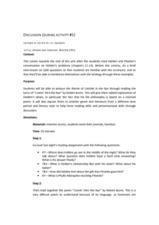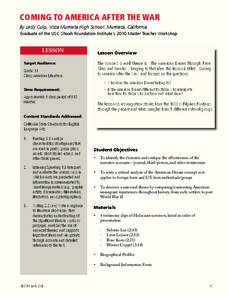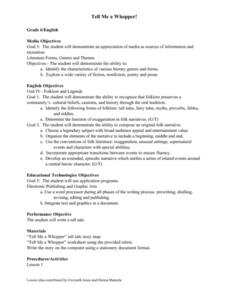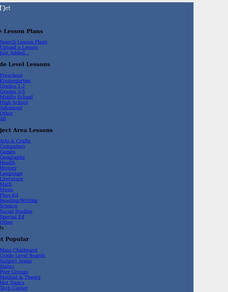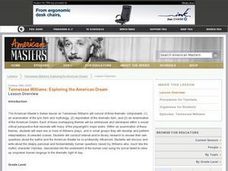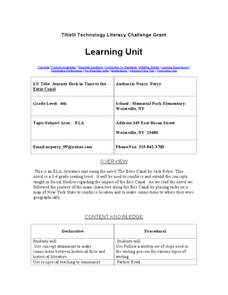Curated OER
Jabberwocky-Identifying Adjectives
Elementary learners identify adjectives in sentences. They read the poem "Jabberwocky" by Lewis Carroll and highlight the adjectives. A good supplemental lesson if you are studying Lewis Carroll and/or "Jabberwocky."
Curated OER
The Catcher in the Rye: Chapters 21-23
After answering comprehension questions (good for a homework reading check), class members analyze "Comin' Thro the Rye," and using the included guidance questions, discuss Holden's misreading of Robert Burns' poem. The URL to text of...
University of Southern California
Coming to America After the War
As part of their exploration of the American dream, class members examine primary source materials to compare immigrant experiences of those arriving early in our country's history to those arriving in the US after World War II. To...
Curated OER
Tell Me a Whopper!
Sixth graders investigate tall tales as a literary genre. They listen to a number of tall tales to discover how exaggeration is used as a story element. They write and publish a tall tale using word processing software. They illustrate...
Curated OER
Modesto City Schools Library Lesson Plan
Students read and understand a variety of genres in a library setting. In this library activity lesson, students act as detectives and use clues in text and pictures to hypothesize the title of the missing book for the library reading...
Curated OER
Pizzeria (reading Encouragement)
Students create a pizzeria atmosphere in the classroom with Italian music, pizza menus and checkered table cloths. They compare their different tastes in pizza toppings to different tastes in reading. Then they use a reading menu to...
Curated OER
Hearing the Poetry of Langston Hughes Through the Sounds of Jazz
Students have an appreciation of Langston Hughe's poetry and his use of jazz rhythms, have the ability to read poetry closely, and freewrite to gain a fresh perspective on music and literature.
Curated OER
Perspective on the Slave Narrative
Students work with the slave narrative as a resource for historical study and evaluate it as a work of literature; students then examine the narrative in the context of political controversy as an argument for abolition.
Curated OER
Reading Comprehension Strategy Ideas
Young scholars participate in pre-reading activities, journal keeping, vocabulary lists and other reading comprehension boosters. These activities can be applied to many genres.
Curated OER
Myths and Folk Tales
Seventh graders perform research in order to appreciate stories taken from the genre of myths and fables. The examples of the stories create a context for students to create their own myths.
Curated OER
Poetry Search
For this Literature worksheet, students identify and locate vocabulary terms related to poetry. There are 27 words located in the word search.
Curated OER
Humans and the Natural World Poetically
Students read poetry for gist and find images to create a visual narrative. In this poetry lesson, students read Green Lane and Flies and Nettles to examine the relationship between humanity and the nature. Students reflect on a place...
Curated OER
Poetry-The Essence of Life
Students analyze and appreciate various types of poetry. In this poetry unit, students read classic and contemporary works to discover ways in which poetry expresses strong feelings. Students identify key vocabulary used to analyze...
Curated OER
Nonfiction Assignment Sheet
In this nonfiction genre worksheet, students read a nonfiction story and then complete a summary, vocabulary, interpretation, criticism, and a personal response.
Curated OER
Mary Shelley's Frankenstein
Students complete close reading and analysis activities for Mary Shelley's Frankenstein. In this literature analysis lesson, students complete multiple close reading and analysis activities to evaluate the 19th century story.
Curated OER
Checkmate
Students start identifying the cause and effect relationships in games of Chess. Using the internet, they research the history of the game and how the roles for each of the pieces. They develop a skit based on the roles and...
Curated OER
Poet Naomi Shihab Nye
Students read and analyze poetry by Naomi Shihab Nye. They define stereotypes, view and discuss a video interview with Nye, present an oral reading of a poem, and write a persuasive letter to an author.
Curated OER
The Shakespeare Crowd
Students study the life and times of Shakespeare. They read and analyze one of his plays and use the Internet and videos to gain an understanding of how Shakespeare engaged his audiences, then and still today.
Curated OER
All About Bugs
Students read "The Very Hungry Caterpillar" and practice the days of the week. In groups, they create a puppet show, design cards of the "days of the week," draw their favorite part of the story, create a visual representation of each...
Curated OER
Unit Plan for Mark Twain and American Humor
Students create brochures about the humor of Mark Twain. In this literature-analysis lesson plan, students read "The Celebrated Jumping Frog of Calaveras County" and other short stories by Twain. Students write analytical paragraphs and...
Curated OER
Tennessee Williams: Exploring the American Dream
Young scholars read and analyze selections of Tennessee Williams' work. They write journal responses, conduct Internet research, perform various scenes from one of Williams' dramas, and create a presentation.
Curated OER
50th Anniversary of Brown v. Board of Education
Students examine a poster of Brown v. Board of Education and discuss what the important details are. They read the story behind the poster and court case. They role play different sections of the case such as the court case or Linda...
Curated OER
Portraits Visual and Written: Louisa May Alcott and Samuel Clemens
Learners discover the life and work of an American author, either Samuel Clemens or Louisa May Alcott. In this study of visual and written portraits instructional activity, students take a look at the authors through four different...
Curated OER
Erie Canal: Journey Back in Time
Fourth graders read the novel, The Eric Canal, identifying the characters and setting. They respond to daily reading by writing in journals and complete a short answer test upon completion of the novel.



